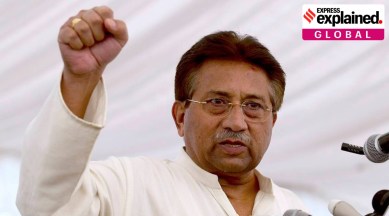How Pervez Musharraf played a role in the Kargil War
The war was triggered after Pakistani forces and infiltrators occupied mountain areas on the Indian side of the LoC. Pervez Musharraf was a key figure in ordering the forces.

Pakistan’s former president Pervez Musharraf died at a hospital in Dubai on Sunday (February 5). The 79-year-old had been undergoing treatment for a serious disease.
Musharraf, a four-star general of the Pakistan Army, seized power after a bloodless military coup in 1999. As the 10th president of Pakistan, he ruled for almost a decade before he resigned in 2008 to avoid getting impeached by the ruling coalition. Soon after, Musharraf moved to London in a self-imposed exile and later shifted to Dubai.
The former president’s tenure was marred by various controversies and missteps. From being accused of human rights abuses to facing charges for the assassination of former Prime Minister Benazir Bhutto in 2007, Musharraf has left a deeply contentious legacy.
In the context of India, he might be best remembered for his role in the Kargil War of 1999. As the chief of the Pakistan Army, Musharraf planned and executed the attack by sending Pakistani intruders into India. However, it turned out to be a catastrophic military failure for him as India pushed back the Pakistanis and defeated them after the three-month-long war.
What was the Kargil War about?
Fought between India and Pakistan from May to July 1999, the battle took place in the Kargil district of the erstwhile state of Jammu and Kashmir and other regions along the Line of Control (LoC).
The war was triggered after Pakistani forces and infiltrators occupied mountain areas on the Indian side of the LoC. According to reports, Pakistan Army’s initial plan was to capture “as many posts as possible on the heights across the LOC vacated by the India Army due to snowy winters.”
They wanted to use the captured land as a bargaining power to negotiate the Siachen conflict. The army also believed that the conflict would internationalise the Kashmir dispute, which might lead to a speedy resolution in Pakistan’s favour.
What was Musharraf’s role in the Kargil War?
Besides Army chief General Musharraf, the plan was hatched by three other generals — Lt General Aziz Khan, Lt General Mahmud Ahmad and Maj General Javed Hasan — and together, they were infamously known as the “Gang of four” of the Pakistan army.
However, their ambitions were foiled after in a joint operation, called Operation Vijay, the Indian Air Force and the Indian Army defeated the Pakistanis.
The conflict resulted in deterioration of the Indo-Pak relations. The Indian government felt betrayed by Pakistan as the attack came just months after Prime Minister Vajpayee and Prime Minister Nawaz Sharif inked a landmark bilateral peace declaration called the Lahore Agreement in February 1999.
In a 2018 interview, Sharif revealed that Vajpayee told him that “he had been stabbed in the back with the Kargil misadventure because it came soon after the Lahore Declaration.” Although the former Pakistan prime minister has always maintained that Musharraf kept him in the dark about his plans, some analysts believe Sharif was briefed about the operation in three separate meetings.
In his piece for The Indian Express, Azad Singh Rathore, a defence and foreign policy analyst, wrote, “It seems that the then Pakistani PM was ill-informed about the relative strengths of the two armies on LOC. Sharif was confident that his men would get Kargil and later Siachen. The Kargil operation proved to be Pakistan’s biggest blunder after the 1971 war.”